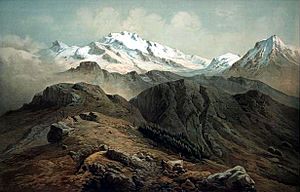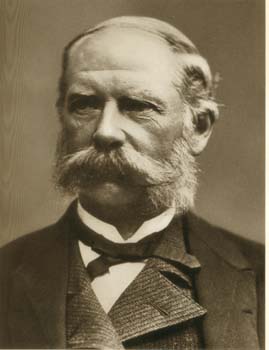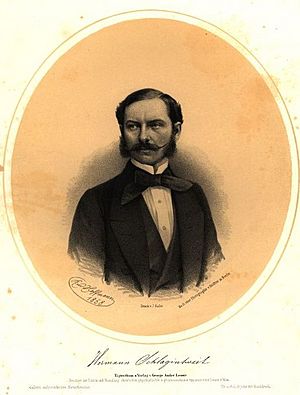Hermann Schlagintweit facts for kids
Hermann Schlagintweit (born May 13, 1826 – died January 19, 1882) was a German explorer. He was also known as Hermann Rudolph Alfred von Schlagintweit-Sakünlünski. Hermann and his brothers, Adolf and Robert Schlagintweit, were famous explorers. They were hired by the British East India Company to study the Earth's magnetic field in South and Central Asia. They were the first Europeans to cross the Kunlun mountains. They also explored the area between the Karakoram and Kunlun mountains.
Contents
Life and Adventures
Hermann was the oldest of five brothers from Munich, Germany. With his brother Adolf, he wrote a scientific book about the Alps mountains between 1846 and 1848. This book helped them become well-known scientists. Later, their brother Robert joined them. Together, they published more books about the geography and geology of the Alps.
Exploring Asia
In 1854, a famous scientist named Alexander von Humboldt suggested Hermann and his brothers for a big mission. The East India Company asked Hermann, Adolf, and Robert to do scientific research in their lands. Their main job was to study the Earth's magnetic field.
For the next three years, the brothers traveled a lot. They explored the Deccan Plateau in India. Then, they went up into the mighty Himalayas, the Karakoram, and the Kunlun Mountains.
Hermann and Robert made history by being the first Europeans to cross the Kunlun mountains. Because of this amazing achievement, Hermann was given the special title "Sakünlünski."
After the Expeditions
After his adventures, Hermann visited Nepal. Then, he went back to Europe. With Robert, he published a huge work called Results of a Scientific Mission to India and High Asia. This book came out in four parts between 1860 and 1866.
Hermann spent the rest of his life doing scientific and writing work. He lived in Munich and at Schloß Jägersburg castle.
Botanical Discoveries

The Schlagintweit brothers collected many plant samples during their travels. These plant collections are kept in special places called herbaria around the world. A herbarium is like a library for dried plant specimens.
In 1853, a botanist named Griseb. named a new group of flowering plants after the brothers. This plant group, found in Europe, is called Schlagintweitia. It belongs to the daisy family, Asteraceae. This was a way to honor Hermann, Adolf, and Robert for their contributions to science.
Writings and Publications
Hermann Schlagintweit wrote many books and reports about his scientific work and travels. These books shared his discoveries with the world. Some of his important works include:
- Untersuchungen über die physikalische Geographie der Alpen, published in 1850. This book was about the physical geography of the Alps.
- Results of a scientific mission to India and high Asia, published between 1861 and 1866. This large work shared all the findings from their big trip to Asia. It even included an atlas with maps and pictures.



